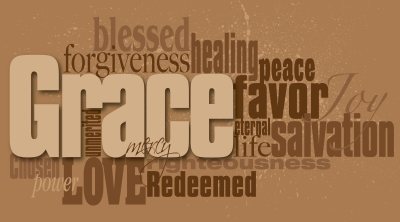Grace in Context
By Jim Huskins
McDowell County
After thirty years of pulpit ministry, my wife and I realized that all of God’s word is truth, and all of it is still in force. Four years ago, most of our Christian friends dropped us when we began suggesting that the first five books of the Bible are the still-valid instructions for how God wants His people to live. Some were offended when we stopped observing the pagan worship rituals which have been foisted on the world as “Christian” holidays. Most were incensed when we pointed out that the Fourth Commandment was never revoked in Scripture and that God expects His people to rest and worship on the Seventh Day of the week. We were ridiculed when we stopped eating any meat that the Bible specifically declares to be unclean.
But the most common criticism we have faced is that we do not understand grace. Most Christians apparently believe that “grace” is some magic potion that Jesus brought to earth for the first time. Even worse, they think that once we repeat some unBiblical “sinners prayer” and get sprinkled with “fairy dust grace,” then Jesus is obligated to save us in the end regardless of how we live in the meanwhile. This is not what the Bible teaches.
Grace has existed from the beginning. Grace allowed Adam and Eve to live following their sin. Grace allowed Noah and his family to survive the flood. Grace spared Jonah’s life for three days in the belly of a fish. Grace kept King David alive and in power following his commission of adultery and murder. Grace allowed the Kingdom of Judah to return and rebuild following seventy years of well-deserved captivity. Grace is as old as humanity, and the conditions under which grace is applied have never changed. One of the best passages for putting grace in context is Psalm 103.
This entire chapter is about Grace. “Bless YHVH, O my soul, and all that is within me, bless His holy Name. Bless YHVH, O my soul, and forget not all His benefits: He forgives all your iniquity. He heals all your diseases. He redeems your life from the Pit. He crowns you with lovingkindness and compassions. He satisfies your years with good things, so that your youth is renewed like an eagle. YHVH executes justice—judgments for all who are oppressed. He made His ways known to Moses, His deeds to the children of Israel. YHVH is compassionate and gracious, slow to anger, and plentiful in mercy. He will not always accuse, nor will He keep His anger forever. He has not treated us according to our sins, or repaid us according to our iniquities. For as high as the heavens are above the earth, so great is His mercy for those who fear Him. As far as the east is from the west, so far has He removed our transgressions from us. As a father has compassion on his children, so YHVH has compassion on those who fear Him. For He knows our frame. He remembers that we are but dust. As for man, his days are like grass—he flourishes like a flower of the field, but when the wind blows over it, it is gone, and its place is no longer known. But the mercy of YHVH is from everlasting to everlasting on those who revere Him, His righteousness to children’s children.”
These are the first seventeen verses of Psalm 103. Most of us have heard this passage. We rightfully celebrate its assurance that God is loving and forgiving. We treasure hearing these words woven into funerals. Many believers turn to this Psalm during dark moments of self-doubt, when satan whispers into our ears that God could not possibly love us, not after all we have done. This is all well and good. The problem is that we stop reading after verse 17.
The final four verses of Psalm 103 are a benediction calling us to “Bless YHVH.” Between this marvelous sermon on grace and its powerful benediction is one of the most ignored verses in Scripture. Psalm 103:18 gives the everlasting context of grace, “to those who keep His covenant, who remember to observe His instructions.”
Salvation is a free gift by grace through faith. Because of our Western mindset, we think that “faith” is merely giving intellectual assent to some stated proposition. Saving faith can only be understood through the Hebrew word, emunah. It means “to believe and obey.” James expressed it this way: “Show me your faith without works, and I will show you faith by my works.” (James 2:18). The “works” he references are acts of obedience to God’s instructions for living found in the Torah. If we believe, our lives will be characterized by obedience.
We will all be judged, not on what we say that we believe, but on how we have lived. Psalm 62:12, Proverbs 11:31, Proverbs 24:12, 1 Corinthians 3:8, 1 Corinthians 4:5, 2 Corinthians 5:10, Colossians 3:25, 1 Peter 1:17, and Revelation 20:12 all underscore what Paul says in Romans 2:6-8, “He will pay back each person according to his deeds. To those who by perseverance in doing good are seeking glory, honor, and immortality—eternal life. But to those who are self-seeking and do not obey the truth, but obey unrighteousness—wrath, and fury.”
Jesus died so that we need not die. How then shall we live? God’s grace is marvelous, but it is only available in proper context. That context is obedience. 1 John 2:3-4 says that the only evidence of us being in a saving relationship with Jesus is that we keep His commandments.
Obedient Heart Fellowship believes that the entire Bible is both true and relevant. We accept salvation by grace through faith in Jesus, and we attempt to love and serve Him by keeping his commandments. See Revelation 14:12. lostranger@mindspring.com
__________________________________________________
Jim & Beverly Huskins are members of Obedient Heart Fellowship in McDowell County. You can read more good Christian news from Jim HERE.
__________________________________________________








